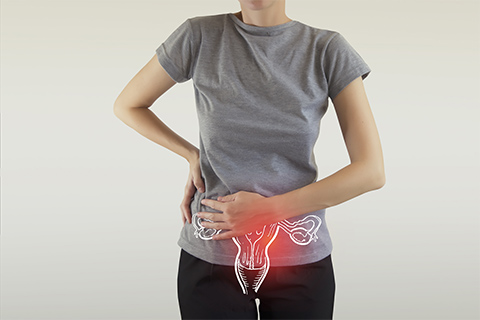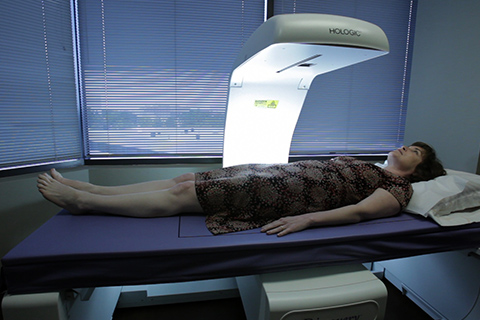Menopausal Care
Women today spend half their lives in menopause. Menopause is a natural transition but the loss of ovarian function heralds an acceleration of the aging process. In particular, menopausal women note cognitive dysfunction often describing difficulties with memory and focus. They may experience bone loss, cardiovascular disease and menopausal symptoms like hot flashes and night sweats.

The aging process is a natural process. On the one hand there are the negative consequences of aging. This results from the natural process of pre-programmed cell death. Conversely, cells of a certain age are more likely to contain DNA damage that, when left unchecked, could develop into cancer. If a cell line is unable to die out it cannot effectively limit its damage. Therefore cell death can be a body’s means of protecting itself against cancer.
By slowing the protective cell death process, some anti-aging therapies may allow tumors to develop. Medical science is always looking for therapies that effectively balance the safety mechanism of DNA repair and cell death while also slowing the aging process. Ideally, we wish to limit aging without increasing the risk of cancer.
Hormone Replacement Therapy (HRT)
HRT appears to have anti-aging properties. Estrogen reduces many health consequences of aging including osteoporosis, and bladder and vaginal tissue degeneration. Estrogen also acts on the cardiovascular system and the nervous system.
The initial results of the Women’s Health Initiative (WHI), which were released in 2002, indicated a greater risk to postmenopausal hormone replacement therapy (HRT) than previously thought. Many experts now believe the study was over-generalized and alarmist, overemphasizing the risk of HRT while minimizing the benefits. In the interim, additional studies (including HERS I, HERS II, and ESTHER) have clarified many of the WHI findings thankfully bringing those findings into proper perspective.

HRT can be given orally or trans-dermally. There are advantages and disadvantages to each method of administration.
The liver is the body’s organ that detoxifies substances that are eaten. Everything that is ingested goes to the liver first. Many medicines are seriously weakened because of this protective mechanism in the body. Only 2-10% of an estrogen tablet that is taken by mouth finds its way into the body. This means that oral preparations have to be far more potent to achieve the same effect as medicines that are applied to the skin. Transdermal preparations go directly into the bloodstream they do not affect liver function and require far lower doses. Trans-dermal preparations provide more stable blood levels of hormone. They do not increase triglycerides and do not increase the risk of blood clots. They appear to lower blood pressure. They provide higher testosterone levels, which means improved orgasm and libido.
Oral estrogens are particularly useful for women who have localized reactions to patch adhesives or other objections to the trans-dermal approach. There are more oral products that combine estrogen and progesterone into a single delivery product.
Today we tailor HRT to the individual. We take into account a woman’s age; we minimize her dose and determine how to administer the medication. We have estrogen products available through prescriptions that are “bio-identical” to a woman’s natural estrogen: estradiol 17-ß. We provide a woman with the smallest dose, providing her with the greatest benefit for the shortest time needed.
“Bio-identical” Hormones
Popular culture is currently experiencing a glut of misinformation about the benefits of “bio-identical” hormones that have been compounded for the “individual”. It is difficult as a health care provider to combat popular media especially when it feeds directly into women’s fears about breast cancer. If these products are really that good then they should be able to prove it to the scientific community by going through the rigors of the FDA process.
The FDA tests products for purity, potency, efficacy and safety. Lack of FDA regulation means that claims made about the benefits of compounded “bio-identical”s may be erroneous.
Because there is no regulatory oversight on these products quality and consistency in dosing may be off. There is no prescribing information for these products and patients do not have risk or safety information available for them to examine. Insurance may not cover these unregulated compounded preparations.
The term bioidentical means “chemically indistinguishable from the hormones produced in a woman’s body, namely estradiol 17-ß and progesterone. There are numerous FDA approved drugs that contain these hormones. These drugs are derived from plant sources and can be called “bio-identical”.
Just because the unregulated “bio-identical”s come from natural plant-based sources does not mean they are not synthesized in a factory. The ONLY truly natural source of estradiol 17-ß is the human ovary. All estradiol 17-ß containing products FDA regulated and otherwise are synthesized in factories. Ultimately, they are ALL synthetic.
The compounded products often claim to normalize a woman’s hormone levels. However, blood hormone levels fluctuate throughout the cycle and throughout the day; it is impossible to “normalize” levels that alter from hour to hour. No one can honestly claim to do that. Blood testing of hormone levels beyond confirming the menopausal state is un-informative.
Some FDA approved and regulated formulations that contain estradiol 17-ß
Vaginal preparations
- Vagifem
- Estrace vaginal cream
- Estring
- Femring
Oral preparations
- Estrace
- Menest
- Gynodiol
Transdermal preparations
- Vivelle dot
- Climara
- Divigel
- Evamist
- Estraderm
- Esclim
- Fempatch
Please talk to your doctor or health care provider about your options, we can answer your questions and help you through this transition period so that you are informed about your choices and are taking steps to maximize benefits whilst minimizing risks.
Let's stay in touch
Our monthly newsletter keeps you up-to-date on healthy lifestyle, latest news, and our practice.





